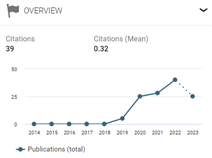The synergy of the religious role in supporting the accelerated reduction of stunting in Kutaraja District, Banda Aceh
DOI: 10.30867/gikes.v5i1.1389Abstract
Background: Stunting is a condition of chronic malnutrition caused by a lack of nutritional intake in the long term, resulting in a decline in the optimal growth and development of a child. In general, the incidence of stunting starts from inadequate nutritional intake during pregnancy until two years of age or more, commonly referred to as the golden period. Therefore, support from community leaders is needed to accelerate the reduction of stunting, a religious role model for the community.
Objective: This study aimed to analyze the synergy of the role of religion in accelerating stunting reduction in Kutaraja District, Banda Aceh City.
Methods: This was a qualitative study with a descriptive design. The informants in this study were religious and active in the Kutaraja sub-district of Banda Aceh City, with a total of 10 religions, and were selected based on specific criteria. Data were collected for two months through an in-depth interview method using a document study and questionnaires designed by the authors. Instrument validity was tested using the triangulation technique. Thematic data analysis was performed.
Result: Religiosity has promoted studies related to parenting, a balanced diet, and a healthy lifestyle by directly becoming speakers in integrated service post activities, being involved in community empowerment activities called village nutrition houses, and being active as marriage counsellors in the office of religious affairs for the bride and groom.
Conclusion: The synergy of religion in community activities can support the accelerated reduction of stunting, which the improvement of community participation in nutritional community empowerment activities can see.Keywords
Full Text:
PDFReferences
Aceh. (2021). Rumoh Gizi Gampong di Aceh. Dinas Kesehatan Provinsi Aceh.
Al Rahmad, A. H. (2019). Pengaruh Penyuluhan 1000 Hari Pertama Kehidupan (HPK) pada Pasangan Usia Subur di Perkotaan dan Perdesaan. Jurnal Kesehatan, 10(1), 147. https://doi.org/10.26630/jk.v10i1.1217
Al Rahmad, A. H., Iskandar, I., Fadjri, T. K., & Hadi, A. (2022). Utilization of the Growth Chart module in Increasing Mother’s Knowledge to Monitor the Grow up of Toddlers. Kesmas Indonesia, 14(1), 110–120. https://doi.org/10.20884/1.ki.2022.14.1.640
Amarita, M. (2021). Keterkaitan pola pangan harapan (PPH) dengan kejadian stunting pada balita. Jurnal SAGO Gizi Dan Kesehatan, 3(1), 7–13. https://doi.org/10.30867/gikes.v3i1.300
Astuti, S. (2018). Gerakan Pencegahan Stunting Melalui Pemberdayaan Masyarakat Di Kecamatan Jatinangor Kabupaten Sumedang. Dharmakarya, 7(3), 185–188. https://doi.org/10.24198/dharmakarya.v7i3.20034
Febi, R. S. (2019). Pemberdayaan Masayarakat Dalam Penanggulangan Stunting Di Desa Pancasila Kecamatan Natar Lampung Selatan (Vol. 126, Issue 1).
Ghafoor, H., Nordbeck, P., Ritter, O., Pauli, P., & Schulz, S. M. (2022). Can Religiosity and Social Support Explain Effects of Trait Emotional Intelligence on Health-Related Quality of Life: A Cross-Cultural Study. Journal of Religion and Health, 61(1), 158–174. https://doi.org/10.1007/s10943-020-01163-9
Ijarotimi, O. S. (2013). Determinants of Childhood Malnutrition and Consequences in Developing Countries. Current Nutrition Reports, 2(3), 129–133. https://doi.org/10.1007/s13668-013-0051-5
Indonesia, P. P. R. (2021). Percepatan Penurunan Stunting Nomor 72 Tahun 2021. In Pemerintah Indonesia (Issue 1).
Kementerian Kesehatan Republik Indonesia. (2018a). Cegah Stunting Dengan Perbaikan Pola Makan.
Kementerian Kesehatan Republik Indonesia. (2018b). Penyebab Stunting Pada Anak (pp. 1–556).
Kementerian Kesehatan Republik Indonesia. (2018c). Potret Sehat Indonesia dari Riskesdas 2018.
Kementerian Kesehatan Republik Indonesia. (2021a). Laporan Kinerja Kementrian Kesehatan Tahun 2020. Kementerian Kesehatan Republik Indonesia Tahun 2021, 1–224.
Kementerian Kesehatan Republik Indonesia. (2021b). Survey Status Gizi Indonesia.
Lipowska, M., Modrzejewski, A., Sawicki, A., Helmy, M., Enea, V., Liu, T., Izydorczyk, B., Radtke, B. M., Sajewicz-Radtke, U., Wilczyńska, D., & Lipowski, M. (2022). The Role of Religion and Religiosity in Health-Promoting Care for the Body During the Lockdowns caused by the COVID-19 Pandemic in Egypt, Poland and Romania. Journal of Religion and Health, 61(5), 4226–4244. https://doi.org/10.1007/s10943-022-01624-3
Luetke L. H., Rossmann, C., & Kargbo, S. I. (2022). Exploring the Contextual Factors of Religious Leader Participation in Health Communication: Evidence from a Qualitative Study in Sierra Leone. Journal of Religion and Health, 0123456789. https://doi.org/10.1007/s10943-022-01632-3
Munip, Menap, Sismulyanto, B. N. (2021). Peran tokoh agama dalam mencegah covid-19 dan mengurangi stigma covid-19 di kecamatan gunungsari kabupaten lombok barat. JKKI: Jurnal Kebijakan Kesehatan Indonesia, 10(04), 182–190.
Miko, A., & Al-Rahmad, A. H. (2017). Hubungan berat dan tinggi badan orang tua dengan status gizi balita di Kabupaten Aceh Besar. Gizi Indonesia, 40(1), 21. https://doi.org/10.36457/gizindo.v40i1.222
Noviansyah. (2022). Strategi Percepatan Pencegahan Stunting Dengan Pendekatan Keagamaan Guna Mewujudkan Generasi Berkualitas (Studi pada Wilayah Kantor Kementerian Agama Kabupaten Pringsewu). Disertasi, 1–200.
Novitasari, Kusuma, A. R., & Zulfiani, D. (2021). Pelaksanaan program pembangunan keluarga kependudukan dan keluarga berencana (bangga kencana) Kota Samarinda. EJournal Administrasi Publik, 9(1), 4778–4791.
Parhani, I. (2018). Peran Ulama Dalam Pendampingan Perempuan Yang Positif Hiv Dan Aids. Al-Banjari : Jurnal Ilmiah Ilmu-Ilmu Keislaman, 17(1), 81. https://doi.org/10.18592/al-banjari.v17i1.1439
Rachmi, C. N., Agho, K. E., Li, M., & Baur, L. A. (2016). Stunting coexisting with overweight in 2·0-4·9-year-old Indonesian children: Prevalence, trends and associated risk factors from repeated cross-sectional surveys. Public Health Nutrition, 19(15), 2698–2707. https://doi.org/10.1017/S1368980016000926
Rahmanindar, N., Izah, N., Astuti, P. T., Hidayah, S. N., & Zulfiana, E. (2021). Peningkatan pengetahuan tentang persiapan pranikah sebagai upaya kehamilan sehat untuk mencegah stunting. Journal of Social Responsibility Projects by Higher Education Forum, 2(2), 83–86.
https://doi.org/10.47065/jrespro.v2i2.973
Rahmawati, I., Utami, I., & Lestari, S. (2019). Faktor-Faktor Yang Berhubungan Dengan Kejadian Gizi Kurang Pada Balita Usia 12-59 Bulan Di Desa Srimartani.
Rokom. (2022). Upaya Ibu Cegah Anak Stunting dan Obesitas. In Sehatnegeriku.Kemkes.Go.Id.
Samsudin, A., & Prabowo, H. (2022). Community-based health coverage at the crossroad: The Muhammadiyah health fund in Indonesia. Indonesian Journal of Islam and Muslim Societies, 12(1), 111–138. https://doi.org/10.18326/ijims.v12i1.111-138
Santoso, M. A. F., & Khisbiyah, Y. (2021). Islam-based peace education: Values, program, reflection and implication. Indonesian Journal of Islam and Muslim Societies, 11(1), 185–207. https://doi.org/10.18326/IJIMS.V11I1.185-207
Saragih, F. A., & Gurning, F. P. (2023). Upaya percepatan program pencegahan stunting dengan pendekatan pembinaan kader di Kota Medan. Jurnal SAGO Gizi Dan Kesehatan, 4(2), 311–318. https://doi.org/10.30867/gikes.v4i2.1275
Wagianto, R. (2021). Konsep keluarga ma ṣ la ḥ ah dalam perspektif qira’ah mubadalah dan relevansinya dengan ketahanan keluarga di masa pandemi COVID-19 Ramdan Wagianto. Junal Ilmiah Syariah, 20(1), 1–17.
Zahratunnisa, Z. (2020). Peran Ulama Dalam Mitigasi Pandemi Covid-19. ’Adalah, 4(1), 259–269.
Refbacks
- There are currently no refbacks.













